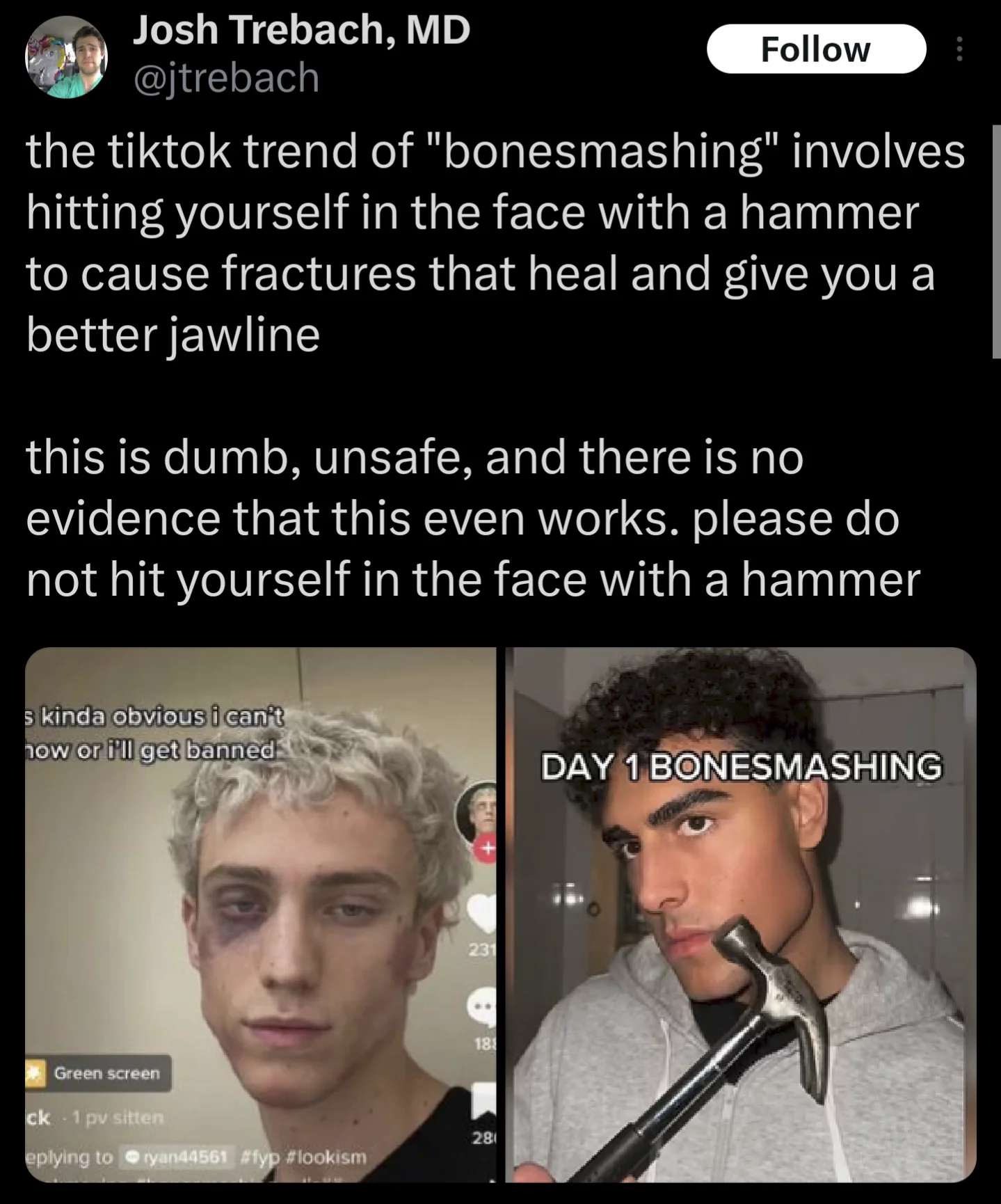this post was submitted on 02 Jul 2024
327 points (96.1% liked)
Facepalm
2651 readers
4 users here now
founded 1 year ago
MODERATORS
you are viewing a single comment's thread
view the rest of the comments
view the rest of the comments

So, there is a tiny kernel of truth to the core concept here:
If you repeat a process of microfracturing a bone, letting it heal, doing it again... it can result in either reshaping or strengthening of the bone. It can also result in neither of those things happening.
In rare but real medical procedures you sometimes intentionally break a bone and the set it up to heal in a more proper configuration or orientation, or do this repeatedly to attempt to grow your leg length.
With many forms of martial arts it has been postulated that a lot of the seemingly super human acts of endurance of various kinds are partly possible because of years of microfractures which heal and make the bones stronger over time, along with the rest of the training regimen.
If I remember the evolution of this part of looks maxxing, originally it was people doing like 30 minutes of tapping various parts of their faces to attempt to do this to their facial bones, to extenuate them overtime.
Can't say I've ever seen any actual evidence this is any kind of real medical procedure.
But uh yeah, a good number of people seem to miss the idea of this being light and repetitive.... smashing yourself in the face with a hammer is not going to cause microfractures.
That'll cause much worse fractures. And possibly lots of other serious problems.
Oh well. Choke to death on marshmallows playing chubby bunny, poison yourself with tide pods, create a brain bleed and kill yourself via a hammer to the face. I wonder what the next thing will be.
I remember seeing something about this on the Guiness World Record Show when I was a kid and then spending my time repeatedly punching the wall while in the shower.
I've never really gotten into a fight or done anything cool with them but now my hands go numb sometimes so there's that.
When I did Karate... oh god my Sensei would thwap me for not knowing the name, but we practiced form with basically a wooden 2x4, vertically placed in a mount, with twine wrapped around the target area.
The point of the thing was repetitious form practice.
If you hit it too hard, it would recoil and then come back and hit you again.
Hit it too soft and there's no noise at all.
A neat way of moderating how hard you're supposed to be striking.
Anyway, sorry your hands go numb sometimes =(
Micro fractures caused in martial arts will lead you to vomit and need to take 2 weeks to recover. Speaking from experience. X-rays and all. Do not recommend.
If you’re talking about toughening such as like they do in the practice of shin conditioning, that’s just killing nerves. It has Nothing to do with ‘reshaping bones’.
To follow the thread of tangentially related concepts:
The Ilizarov apparatus (caution NSFL). The leg is intentionally broken, then a terrifying cage encourages it to heal in a different size or shape.
I'm not sure how much it's used now, but I was presented with it as patient as a potential option about 20 years ago. It was kind of a "please don't pick this one it's clearly worse" choice. Thankfully they'd done about a decade of prep work to enable me to pick the less extreme option.
The singer / guitarist from Weezer had his legs broken and extended to become taller. Rivers Cuomo was his name. It still is too.
I'd be very surprised if it was to become taller. I'd have to watch the clip again, but I only recall seeing the device stretching his pants on one leg.
I know they'll do it to fix leg length discrepancies above a certain threshold, especially if the other procedure isn't viable. I don't know if there's other medical reasons to consider it.
One of his legs was a bit longer than the other so he got it fixed; my understanding is it's incredibly painful so not especially common.
That's my understanding of the procedure as well. The other method requires more prep but is quite easy.
If they catch it early they can measure how fast each leg is growing at 6 month intervals (and other measurements). Then they can go in and tell the longer leg to stop.
That procedure can be close to painless. A month with a soft cast and crutches, another month with just crutches, and a third month with no physical activity.